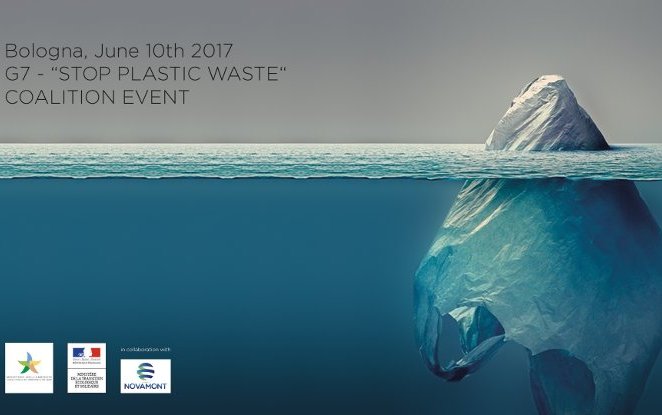G7 Environment: Novamont, the French and Italian Environment Ministries hosted the event “The International Coalition Stop Plastic Waste- A bioeconomy cultural revolution to save the oceans”
In the context of the G7 Environment, NOVAMONT, in collaboration with the Italian and French Ministries of Environment, organized on June 10th in Bologna the conference "The International Coalition Stop Plastic Waste - A bioeconomy cultural revolution to save the oceans”.
The initiative gave an overview of the policies tackling marine littering from plastic waste and the activities of the "Stop Plastic Waste Coalition" launched at Cop22 in Marrakech. The Coalition brings together local and national governments from 12 countries: Italy, France, Morocco, Chile, Monaco, Mauritius, Sweden, Bangladesh, Australia, Senegal, Croatia and the Netherlands.
Catia Bastioli, Novamont’s CEO, showed the contribution that bioeconomy can give to circular economy. Organic waste properly collected with biodegradable and compostable bags and organically recycled into compost, could increase the amount of carbon stored in the soils and contribute significantly to the reduction of greenhouse gas emissions. Ms Bastioli also illustrated Novamont’s biobased products, from biolubrincants to bioherbicides, showing the environmental benefits and the positive effects on Europe’s economy through thanks to a reindustrialization of local areas.
Baptiste Legay, from the French Ministry for Ecological and Solidarity-Based Transition, presented the measures put in place by France on the issue. Inspired by the Italian legislation on plastic bags, France banned plastic bags, allowing only compostable plastic bags for fruit and vegetables. Francois Galgani, from Ifremer (French Research Institute for Exploitation of the Sea), illustrated the studies and the action tackling the littering of plastic bags.
Delphine Lévi Alvarès, Product Policy Officer of the NGO Zero Waste Europe, stressed how it is important to focus on prevention rather than cure and providing effective solutions to marine litter.
John Persenda, Sphere Group’s CEO, outlined how thanks to Italian and French legislation, the plastics industry has been able to develop and promote sustainable products, such as compostable bags.
Habib El-Habr, Coordinator of the Global Programme of Action for the Protection of the Marine Environment from Land-Based Activities and Director and Regional Representative of the United Nations Environment Programme (UNEP) Regional Office for West Asia, illustrated the actions adopted at global level in order to bring on board national governments.
Mariano Grillo, Director-General of Waste and Pollution of the Italian Ministry of the Environment, gave an overview of the national legislation already put in place and that will be implemented in the future for a more comprehensive “marine strategy”, which will also provide measures on marine littering.
Rossella Muroni, Legambiente’s President, illustrated the Italian NGO campaign on the ban on plastic bags from the sea. Ms Muroni remembered how Italy was the first one to ban plastic bags and how Novamont innovated the sector introducing a new product giving a valuable alternative.
Professor Fabio Fava, from the School of Engineering of University of Bologna, showed how a Circular Bioeconomy can contribute to build a real circular economy. Specifically how biodegradable and compostable plastics represents an example on how to implement this switch and also create green jobs.
Marcelo Mena Carrasco, Minister of the Environment of Chile talked about what the South American country is doing in order to protect the Pacific Ocean from microplastics supporting the UN Environment “Clean Seas Initiative” and implementing new legislative measures on recycling for packaging.
Vincent Biruta, Minister of Natural Resources, Republic of Rwanda shared the experience of the country, which was the first in the African country to ban plastic bags. Besides the ban, Rwanda encouraged the use of biodegradable materials for packaging and a large campaign in order to raise awareness was launched. Rwanda signed the Stop Plastic Waste declaration of intent in order to promote the reduction of plastic waste pollution.
Gianluca Galletti, Minister of the Environment of Italy among the measures for the reduction marine littering talked about the law on plastic bags which allows only biodegradable and compostable bags. The Minister also talked about Italy’s commitment in developing a strong green chemistry in order to protect the environment and create green jobs.
The next day, Catia Bastioli joined the side-event “Firms for Sustainable Development”, together with the most important companies coming from the G7 countries. Bastioli, after presenting Novamont’s experience, as rapporteur opened the event giving the conclusion from the last Environment G7 held on June 12 in Bologna.

